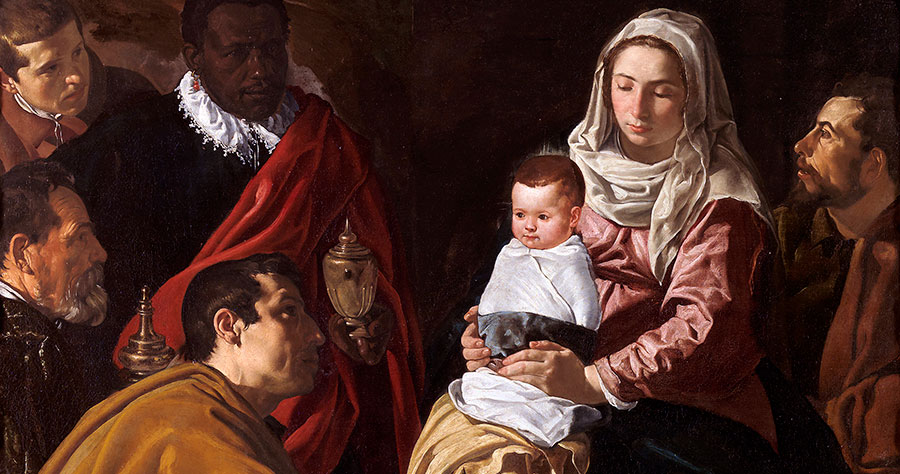Dwight Longenecker, the author of this book, is a fascinating character. Born into an Evangelical Christian family in the USA, he moved to England as a young man and was later ordained for the Church of England. After some years of living the life of a country parson, he left the CofE and became a Roman Catholic and began to earn his living as a writer. Fast forward a number of years more and he was ordained a Catholic priest in the United States, where he now combines his writing career with parish ministry.
I first came across Fr Longenecker some years ago by way of his online blog and over the years have enjoyed the articles he posts on it as well as elsewhere and one or two of the other books he has written. When his most recent book was published I was immediately intrigued by the concept behind it. Truthfully, modern scholarship has rather neglected the Magi. Their story is either dismissed out of hand as a fanciful legend; or considered unlikely on the basis that the Magi mentioned in Scripture must refer to the group of scholars, shamans, and stargazers who had been influential in the courts of Persia centuries before the time of Jesus, but whose power had by then dwindled dramatically and would have had neither the resources nor the interest in Jewish affairs to make so long a journey.
But what if the Magi of the Bible are real and scholars have been looking for answers in all the wrong places as to who they might actually have been? I just finished reading Fr Longnecker’s book and I must say I am extremely impressed. He points out that there is a major problem with the way many scholars look at the story; and that is that no where in Scripture does it claim that the Magi spoken of were the Persian sorcerers they claim they would had to have been. All St Matthew says that wise men came from the East, men who had seen the star of this new king at its rising, and as a result journeyed to Jerusalem.
Fr Longenecker notes that by the time of Christ the term “magi” had come to mean any group of wise men or scholars. And that by saying they had come from the East, St Matthew very clearly identifies where they were from – for that was the Jewish term at the time for Arabia. Now, was there anyone in Arabia who might have wanted to pay homage to a new born king of the Jews? Very much so – there was in that area the kingdom of Nabatea; and the Nabateans not only had their own group of wise men or magi who archaeology demonstrates to have been stargazers, but there was a very strong link between the court of the king of the Nabateans and that of Jerusalem. King Herod’s mother, as it happens, had been a Nabatean princess; and as a young time he himself had spent much time in that court. After his death his son who rose to the throne after him went on himself to marry a princess from that kingdom.
So very strong links existed between Nabatea and Jerusalem. And we may think it very likely that had their wise men, as they studied the stars, felt that some sign in them indicated that a new king had been born to the Jews would think it very appropriate to send a delegation to make the relatively short journey to Jerusalem to go and pay him homage. Indeed, this theory, as well as fitting in much better with known facts, would explain why it was that they went to Jerusalem instead of straight to Bethlehem … for where else would they expect to find a new born king other than in the court of the current king?
Does Fr Longenecker’s explanation prove that the Magi were Nabatean wise men? It does not; but it does not have to. All it has to do is provides a credible case, based on the facts as given to us in Scripture, that the wise men and their visit was indeed something that could easily have taken place. And that it does.
He puts forward a very good case not only in support of his position that the Magi are to be regarded as historical figures but also as to where they might really have been from and who they might have been. He covers the complex archaeological, historical, and scriptural evidence thoroughly enough to impress a scholar and yet in a way that makes it all very accessible for the reader who is coming to this kind of material for the first time.
I would suggest that this is an important book for two reasons. The first that Fr Longnecker’s proposal, well grounded as it is in the available evidence, makes an important contribution to scholarly debate on this issue. The second is that the non-scholarly reader is given an entertaining and highly educational introduction to the history and culture of the time and place it deals with.
I don’t think that Mystery of the Magi is available in Irish bookshops; but it is readily to be found online on sites such as Amazon or Book Depository. It is a fascinating book for which the author deserves much credit and that deserves to be widely read. I think it is fair to say that the mystery of the Magi is a mystery no longer.
About the Author: Rev. Patrick G Burke
The Rev. Patrick G Burke is the Church of Ireland rector of the Castlecomer Union of Parishes, Co Kilkenny. A regular contributor to Position Papers, he was formerly a broadcast journalist with the Armed Forces Radio and Television Network. He blogs at thewayoutthere1.blogspot.ie

